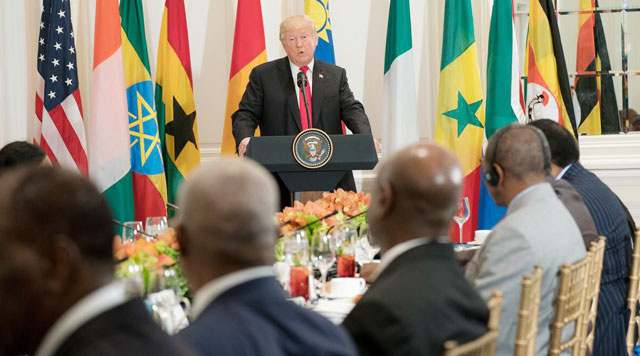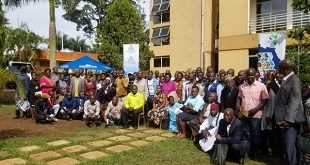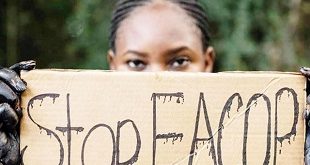
When Trump referred to African nations as “shithole countries” Museveni defended him saying Africans should solve their own problems
Kampala, Uganda | IAN KATUSIIME | The re-election of Donald Trump returned one of President Yoweri Museveni’s favourite American leaders. The two men separated by a two-year age difference have a lot in common. Both love power and wield immense influence in their countries. Museveni was never shy about expressing his fondness for Trump—the billionaire who was first elected in 2016—sending shockwaves across the world.
President Museveni congratulated Trump on a “historic victory” in a post on X and said he looks forward to “mutually beneficial engagement with your administration.” The 80-year-old Museveni will now see out another US administration since he met President Ronald Reagan in 1987.
President Joe Biden’s term will come to an end in January next year and Museveni will clock thirty nine years in power. Museveni will have seen off seven US presidents, three of whom served two four year terms. But of all the seven, Trump appears to be his favourite.
“I love Trump. He speaks to Africans frankly,” Museveni once said while addressing the Ugandan parliament. Museveni did not meet Trump but always spoke highly of the flamboyant US President whose Make America Great Again (MAGA) political movement has established dominion in the world’s most powerful nation.
The movement is rooted in a mythical restoration of America as an empire which entails expelling immigrants and appealing to white racial superiority. But MAGA is also driven by the belief that countries should pull their own weight and not wait on American largesse which sits well with Museveni.
Trump in return has displayed an admiration for strong men of Museveni’s ilk like North Korean leader Kim Jong Un, Saudi Arabian Crown Prince Mohammed bin Salman, and Egyptian President Fattah El Sisi.
Unlike most of his predecessors who were concerned with issues like rule of law and governance in other countries where the US is a benefactor, Trump who is transactional in nature steered clear of the internal politics in other countries and preferred to focus on trade and business dealings.
The 78-year-old Republican did not have much of an Africa policy in his first term but his second path to the White House was not unlike that of many African politicians: a criminal conviction, pending court cases including one of trying to overturn his 2020 defeat by President Joe Biden, and surviving an assassination attempt.
Days after, Biden dropped out of the race owing to pressure from Democrats citing his advanced age and waning mental acuity. He handed the baton to his vice president Kamala Harris whom Trump soundly defeated.
When Trump referred to African nations as “shithole countries” Museveni defended him saying Africans should solve their own problems. Analysts contend that the sanctions applied to a number of Ugandan officials under Biden may not be continued under Trump much as the travel bans will stick.

The US State Department under Biden has slapped sanctions on Speaker of Parliament Anita Among, ministers, unnamed MPs, government officials in relation to corruption, abuse of office and the passing of the Anti-Homosexuality Act. UPDF Generals like Abel Kandiho have also faced travel bans over their alleged involvement in torture of members of the opposition. Commissioner of Prisons Johnson Byabashaija has also been designated under US sanctions.
However former Inspector General of Police Gen. Kale Kayihura was sanctioned for alleged involvement of torture and abuse of political opponents in 2019 during the Trump administration. The designation of the former police chief, who was President Museveni’s righthand man, was essentially the first sanctions placement under a Ugandan official in the contemporary era.
The continued sanctions however have caused tension in the Ugandan government. The US Secretary of State Anthony Blinken routinely announced visa restrictions on “unnamed” Ugandan government officials leading to a lot of second guessing among Museveni officials on whose name could be on the sanctions list.
The sanctions are made under Section 7031(c) of the Department of State, Foreign Operations, and Related Programs Appropriations Act, 2024. As a result of these actions, the designated Ugandan officials are generally ineligible for entry into the U.S.
Speaker Among said in parliament that the election of Trump could mean the end of her diplomatic troubles. Unbeknown to her, US sanctions are rarely lifted and the action requires intense lobbying and backchannelling which can take many years to undo.
However Trump is anti-LGBT being a Republican and since his party now controls both houses in Congress, it is uncertain on what pro-LGBT advocacy in Uganda means in light of the bilateral relations between Uganda and the U.S.
Looming aid cuts
Meanwhile, Trump is expected to announce drastic cuts to global health funding affecting poor countries like Uganda which largely depend on the U.S. for a wide range of health sector programmes.
This would be picking up from his campaign where he influenced abortion bans in the U.S. including a landmark Supreme Court ruling in 2023 that overturned abortion protections. In Trump’s first term, the U.S. reduced its contributions to the UN, family planning and other social programmes, which Republicans denounce as excessive government spending.
Now there are reports that Trump may reintroduce a “global gag rule” that prohibits US funding to NGOs in countries like Uganda if they are providing abortion-related services. This rule applied to all US global health funding.
The Trump administration slashed funding for President’s Emergency Plan For Aids Relief (PEPFAR), a program that Uganda had benefited from immensely for twenty years since it was started under President George Bush.
According to the US Mission in Uganda, PEPFAR has collaborated with the government of Uganda, national, international, and civil society organizations on building Uganda’s capacity to lead the HIV/AIDS response. Focus areas include care and treatment, prevention, impact mitigation, and health systems strengthening.
The US Mission states on its site that the U.S. has invested $3 billion in PEPFAR Uganda since 2004 with 742,000 HIV-positive Ugandans receiving lifelong ARV therapy. In addition, 6 million pregnant women were tested for HIV last year; 466,000 men were circumcised for HIV prevention last year; and the HIV positivity rate among exposed babies tested has decreased from 12 percent in 2010 to 5.3 percent in 2015 through Prevention of Mother-to-Child Transmission activities.
If the next US administration cuts funding for the PEPFAR program, it could severely affect the 1.5million Ugandans living with HIV.
Under Trump, United Nations Population FUND (UNFPA) also took budget cuts which dealt a blow to family planning programs in many parts of the world. The unsubstantiated argument in the Republican base was that UNFPA was facilitating abortions—a hot button issue in the just ended election.
Analysts say since the organisation works on HIV/AIDS relief just like PEPFAR, it is likely to suffer cuts. UNFPA works with the government of Uganda to inform and influence policy on sexual reproductive health, gender-based violence and HIV.
UNFPA therefore supports Uganda’s family planning efforts by ensuring a steady, reliable supply of quality contraceptives, procuring up to one third of the country’s contraceptive requirements according to a statement on the UNFPA Uganda website.
In 2020, in Trump’s last year in office as president, the US declared its withdrawal from the World Health Organisation (WHO) which was at the forefront of fighting the Covid19 pandemic that killed millions of people.
A fact sheet by Guttmacher Institute shows the extent of Trump’s aid cuts to sexual and reproductive health in Uganda in his four year term from 2017 to 2021. It showed a reduction in mobile outreach for contraceptive care at public facilities, a decrease in community health workers providing family planning, slowed uptake of long acting contraceptives and lack of progress in preventing unintended pregnancies, and an uptick in post abortion care cases.
 The Independent Uganda: You get the Truth we Pay the Price
The Independent Uganda: You get the Truth we Pay the Price



